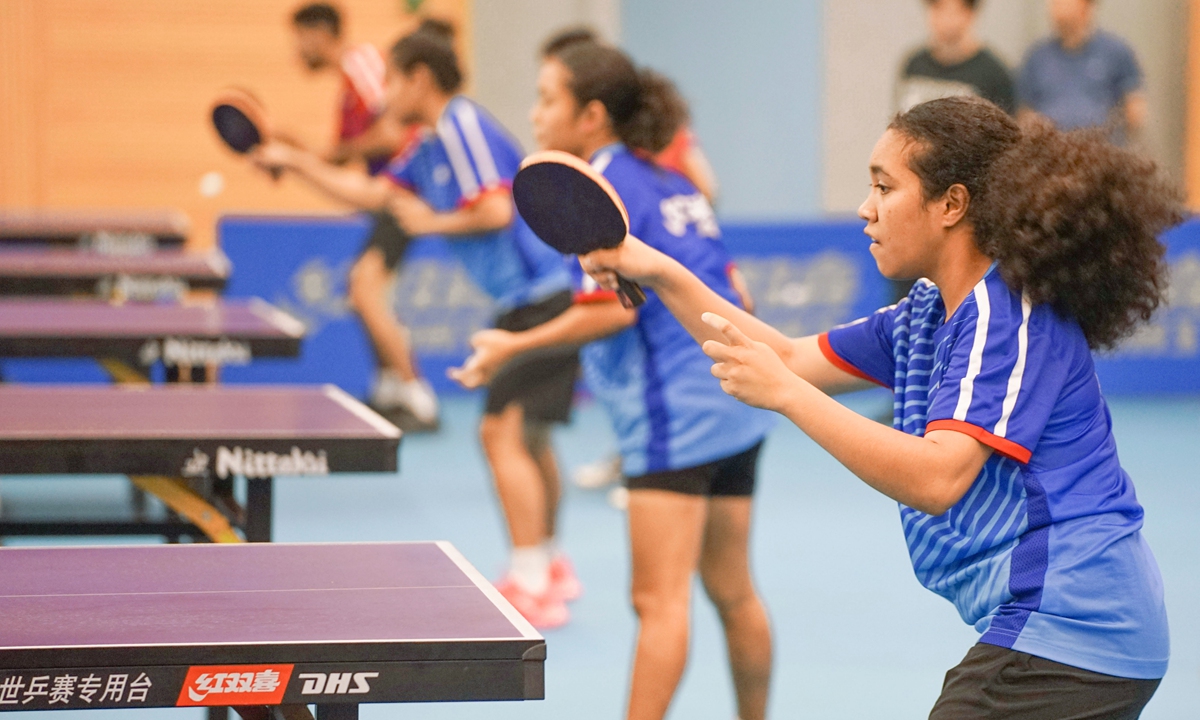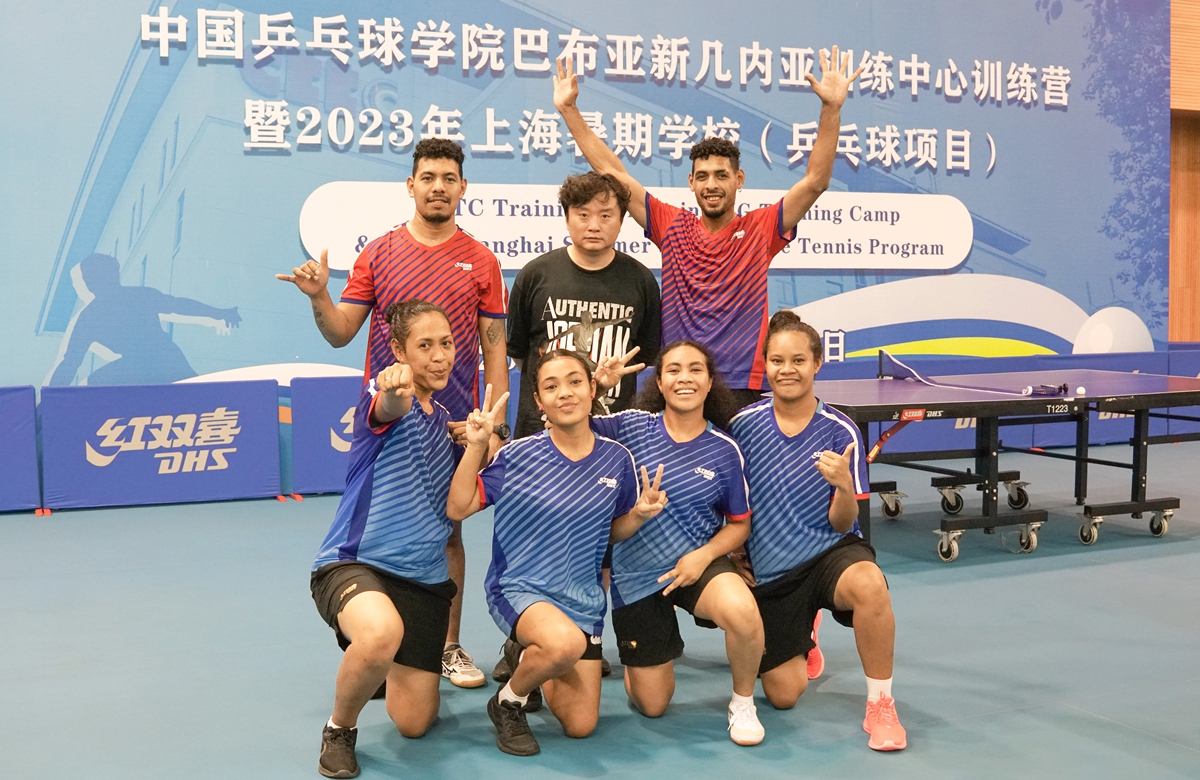
Ping-pong players from Papua New Guinea's national team train in Shanghai on July 2, 2023. Photo: Lu Ting/Global Times
The clear sound of ping-pong balls hitting paddles resonates throughout the bright training hall. At a table, 23-year-old Geoffrey Loi is practicing ping-pong with a Chinese player while a Chinese coach stands beside him, providing guidance on how to improve his stance and grip on the paddle.
Loi is a ping-pong athlete representing the Papua New Guinea (PNG) national team. This summer, he and seven other team members traveled thousands of kilometers from their home country to China for a month-long training program at the China Table Tennis College (CTTC) of Shanghai University of Sport. Their objective is to achieve favorable scores at the upcoming 2023 Pacific Games in November.
"We are very lucky to have the opportunity to come here and get trained," Loi told the Global Times at CTTC's training hall. "It's such a precious opportunity for us to be coached by excellent Chinese table tennis players," he said.
The key to winning
Including Loi, the eight PNG ping-pong players are participating in a training camp that has been specifically organized for them by the CTTC Training Center in PNG.
The CTTC Training Center in PNG was founded in 2018 with the support of Chinese and PNG governments. Every year, CTTC sends experienced Chinese coaches to PNG for several weeks, and also invites PNG players to attend the weeks-long training camps in China.
The center's coaches consist of renowned Chinese ping-pong players, such as Zhang Yining, one of the greatest female table tennis players in the history of the sport, said Ren Jie, executive deputy head of CTTC.
Having been suspended due to the COVID-19 pandemic from 2020 to 2022, the training camp program finally resumed this summer with the participation of eight PNG athletes. The camp commenced in late June and is scheduled to continue until July 20.
Receiving training from top Chinese players in China, the most dominant country in the history of table tennis, is a dream of many ping-pong athletes worldwide. Tammi Agari, one of the youngest players in the PNG table tennis national team, said she was thrilled upon learning earlier this year that she would attend the training camp.
"This is my first time in China. The training is a bit difficult for me, but I'm getting used to it," the 17-year-old told the Global Times.
"I very much enjoy the days of learning more skills here," she said.
Papua New Guinean ping-pong players pose with their Chinese coach Feng Zhe (second row, center) on July 2, 2023. Photo: Lu Ting/Global Times
Having participated in all training camps that CTTC has organized for PNG players over the years, Loi said this is his fifth visit to China.
"I've learned a lot of techniques here, like how to better serve or receive a ball. Everybody here is very friendly," Loi said, adding "we have a much tighter schedule here, but it's not very hard for me. I must try my best to add everything from the training up."
The eight players at the camp are undergoing targeted training in preparation for the 2023 Pacific Games.
"Our primary objective is to help them regain their form after the pandemic and then provide them with techniques and tactics specifically tailored for the Games," the camp's current head coach Feng Zhe, a former Chinese national team player, told the Global Times.
Feng said that PNG ping-pong athletes are ranked at the upper-middle level among all the players from Pacific countries, although they seldom won medals at the Pacific Games in their earlier years.
However, the establishment of the CTTC training center for PNG players has brought about a significant change. In the 2019 Pacific Games, after months of training in China, the PNG national team achieved their best-ever result by securing two silver medals in table tennis.
Loi, one of the silver medalists from that year, told the Global Times that he now has "100-percent confidence" they can compete for the gold medal in this year's Pacific Games after receiving training in China.
"China is the key to winning," he said.
Cultural ambassadors
PNG became the first country in the South Pacific to sign a Memorandum of Understanding (MoU) on the construction of the China-proposed Belt and Road Initiative (BRI). As an important sports project under the BRI, the CTTC Training Center in PNG has received strong support from both governments, said Ren.
In November 2018, Chinese President Xi Jinping visited the training center during his visit to PNG, where he watched Loi and his teammates train with their Chinese coach. Earlier, in June of the same year, PNG's then prime minister Peter O'Neill visited the four PNG ping-pong athletes who were training at the CTTC in Shanghai.
Loi, following his silver medal win at the 2019 Pacific Games, wrote a letter to Xi to express gratitude to China and his Chinese coaches. To Loi's surprise, he received a reply letter from Xi, who congratulated the PNG table tennis team on the good results they won at the Pacific Games, and wished Loi and the PNG team new successes.
"I felt so excited and honored to receive his reply," Loi told the Global Times. He added that he will work harder in improving his ping-pong skills, and try his best to become a cultural ambassador, fostering exchange between China and PNG.
"Learning the Chinese language and Chinese culture are my biggest dreams alongside my passion for ping-pong," said Loi.
With 226 member associations having joined the International Table Tennis Federation, table tennis is a widely enjoyed sport worldwide, Ren said.
Each year, lots of foreign ping-pong players visit China to receive training. In addition to PNG, the CTTC also organizes similar training camps or summer schools for players from different countries, providing them with opportunities to learn and practice ping-pong together with Chinese players and coaches, said Ren.
"Using ping-pong as a platform, we hope to further promote people-to-people exchanges between China and other countries, with a particular focus on fostering interactions among young individuals," Ren told the Global Times.



